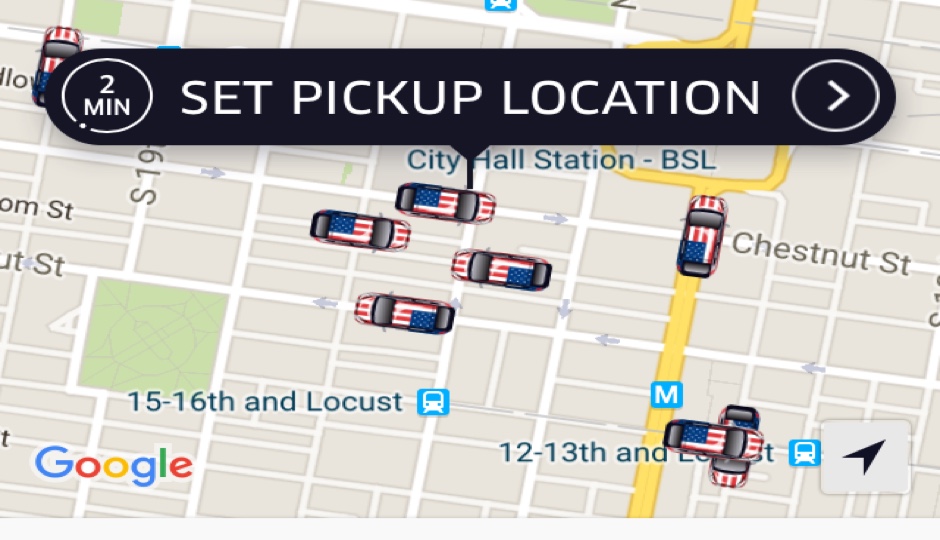PPA Announces Renewed Crackdown on Uber and Lyft, Waives Some Taxi Regs

Uber app display during DNC in Philadelphia. | Photo by Fabiola Cineas
All good things come to an end.
Now that Uber and Lyft’s short and sweet grace period has ended with the expiration of Act 85, the Philadelphia Parking Authority has announced that it fully intends to resume enforcement against the ride-sharing companies – as well as lift several regulations against the taxi industry.
“While we understand that TNC [transportation network company] services are very popular with the public and many elected officials want to see them continue, with the expiration of Act 85, TNC service in now illegal in Philadelphia and the PPA is committed to enforcing the law,” PPA deputy executive director Corinne O’Connor said in a press release.
Act 85, enacted largely to help with the SEPTA Regional Rail transportation crisis and the Democratic National Convention this July, permitted Uber and Lyft to operate without repercussion in the city so long as the companies paid 1 percent of their gross receipts to the PPA. The PPA kept one-third of that amount and passed the other two-thirds to School District of Philadelphia.
The General Assembly is reviewing legislation that could make ride-sharing companies legal if passed this month.
In answer to many reporter questions, the House plans to take up the @Uber #Lyft legislation upon return to Session in October.
— Stephen A. Miskin (@Sam1963) September 29, 2016
“It is more imperative than ever that the House leadership stick to their promise and pass ridesharing legislation the week of October 17th,” Uber officials said in a statement.
Ronald Blount, president of the Taxi Workers Alliance of Pennsylvania, said he thinks the legislation being considered doesn’t quite put the ride-sharing and taxi industries on an even playing field. Blount said he’d like to see increased public safety regulations for Uber and Lyft drivers.
“It doesn’t have to be completely equal,” Blount said, “But there should be some balance so both industries can survive.”
In effort to appease taxicab drivers, who have long been frustrated with the ride-sharing companies, the PPA said it intends to lift a series of regulations against the taxi industry. Blount said the relaxed regulations will release some of the pressure in the industry but are not a “full measure” of the changes he and other drivers would like to see.
The following changes are pending formal board approval, per a PPA press release:
- Upon installation of an approved camera system, operators may remove shields. Operators are free to propose alternative systems for approval, particularly in light of the fact that they may operate without a shield if they have a camera system.
- While the 8 year age limit is statutory; we will Increase mileage limit to 350,000, consistent with PUC mileage limitations.
- Waive requirement for semi-annual inspections until a vehicle reaches 200,000 miles.
- Waive requirement for two-way radios, with the caveat that we will continue to demand compliance with the panic switch requirement to protect drivers.
- We will allow operators to use stand-by vehicles to be used in the event of some problem which will cause the medallion vehicle to be out of commission; the Authority will determine an implementation plan within 30 days.
- We will allow all driver training (standard and WAV) to be done by operators or third parties, provided that a training program and syllabus is first approved by the TLD. The Authority will continue to conduct training for those who do not wish to pursue other training. The Authority will continue to accept all driver applications for the processing of background checks and conduct testing for the issuance and renewal of driver certificates.
- We invite and will expedite consideration of new meter technologies, and are willing to grant experimental/condition authority for such new technologies.
- We invite and will expedite consideration of any petitioner for alternative rate arrangements (for example, differential rates applicable to trips book in advance through applications).
Follow @ClaireSasko on Twitter.


